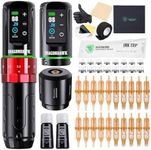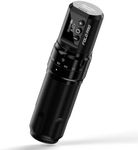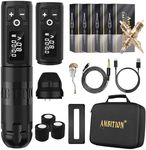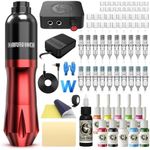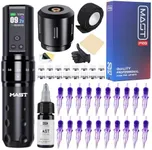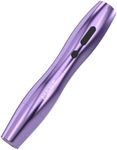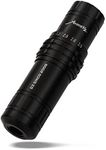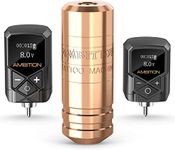Buying Guide for the Best Tattoo Machines
Choosing the right tattoo machine is essential for both beginners and experienced artists. The right machine can make your work more comfortable, precise, and efficient. When shopping for a tattoo machine, it's important to understand the different types and features available, as these will affect your tattooing style, comfort, and the quality of your work. Consider what kind of tattoos you plan to do, your experience level, and how much time you'll spend tattooing. By understanding the key specifications, you can find a machine that matches your needs and helps you achieve the best results.Type (Coil vs. Rotary)Tattoo machines generally come in two main types: coil and rotary. Coil machines use electromagnetic coils to move the needle, and are known for their traditional feel and the ability to fine-tune for lining or shading. Rotary machines use a motor to drive the needle, making them quieter, lighter, and often easier to maintain. If you prefer a classic, customizable experience and don't mind a bit more weight and noise, a coil machine might suit you. If you want something lightweight, low-maintenance, and versatile, a rotary machine could be a better fit. Your choice should depend on your comfort, the style of tattooing you do, and how much you value ease of use versus customization.
WeightThe weight of a tattoo machine affects how comfortable it is to use, especially during long sessions. Lighter machines are easier to handle and reduce hand fatigue, making them ideal for beginners or artists who work for extended periods. Heavier machines can offer more stability and control, which some experienced artists prefer. When choosing, consider how long you'll be tattooing at a time and your own hand strength. If you often experience hand fatigue, a lighter machine is likely the best choice.
Stroke LengthStroke length refers to how far the needle moves up and down with each cycle. Shorter strokes (around 1.8-2.5mm) are better for fine lines and detailed work, while longer strokes (3.5-4.5mm) are suited for shading, coloring, and packing in ink. Some machines offer adjustable stroke lengths, giving you more flexibility. Think about the type of tattoos you want to create: if you focus on lining, go for a shorter stroke; for shading and color packing, a longer stroke is preferable. If you want to do a bit of everything, look for a machine with adjustable stroke length.
Needle CompatibilityTattoo machines are compatible with different types of needles and cartridges. Some machines only work with traditional needles, while others are designed for modern cartridge systems, which are easier and faster to change. If you value convenience and quick needle changes, a machine compatible with cartridges is a good choice. If you prefer traditional setups or already have a collection of standard needles, make sure your machine matches. Always check compatibility before buying to avoid extra costs or inconvenience.
Power Supply RequirementsTattoo machines require a power source, and the voltage range they need can vary. Some machines work best at lower voltages, while others need more power. It's important to match your machine with a suitable power supply to ensure consistent performance and avoid damaging the machine. If you already have a power supply, check its compatibility with the machine you want. If you're starting from scratch, look for machines with a wide voltage range for more flexibility.
Ergonomics and GripThe shape and grip of a tattoo machine affect how comfortable it is to hold and maneuver. Ergonomic designs reduce strain on your hand and wrist, which is especially important for long sessions. Some machines have adjustable or cushioned grips for added comfort. When choosing, consider the size of your hands and how the machine feels when you hold it. A comfortable grip can make a big difference in your tattooing experience and the quality of your work.
